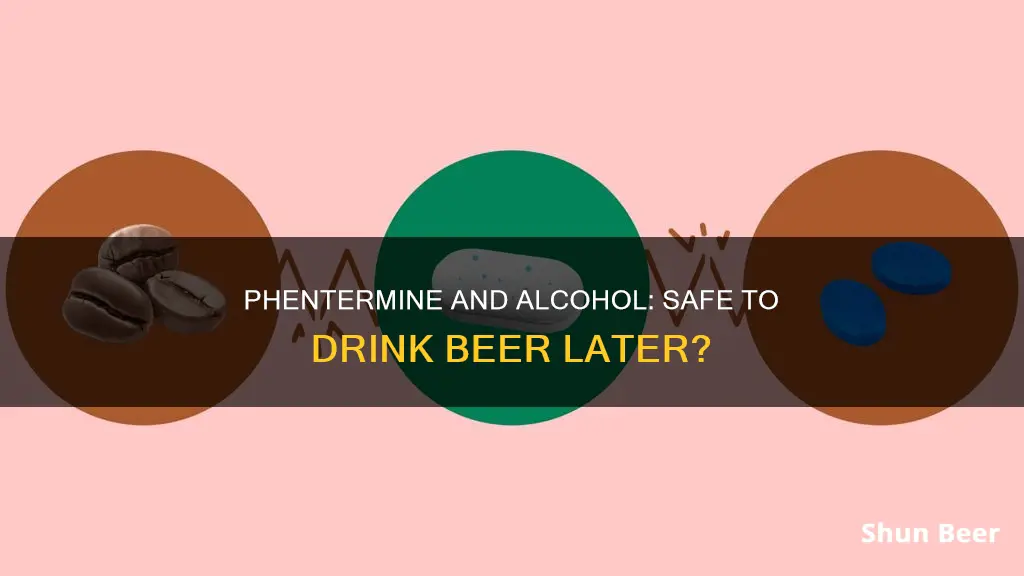
Phentermine is a prescription drug that aids weight loss by suppressing appetite. It is often recommended to people whose obesity is affecting their health and is typically prescribed for short-term use. While it is possible to drink alcohol while taking phentermine, it is generally recommended to refrain from doing so. This is because alcohol can intensify phentermine's side effects, including cardiovascular issues, gastrointestinal problems, and central nervous system effects. The combination of the two substances can also lead to impaired judgment, reduced coordination, and memory loss. To avoid severe reactions, it is suggested that one waits at least 12 hours between consuming alcohol and taking phentermine.
| Characteristics | Values |
|---|---|
| Mixing phentermine and alcohol | Increases the risk of severe side effects |
| Enhances and potentially dangerous side effects | |
| Increases the risk of cardiovascular side effects | |
| Increases the risk of central nervous system side effects | |
| Increases the risk of developing psychological dependence | |
| Increases the risk of gastrointestinal problems | |
| Increases the risk of liver dysfunction | |
| Increases the risk of memory loss and impaired recall | |
| Recommended waiting time between phentermine and alcohol consumption | 12 to 72 hours |
What You'll Learn

Cardiovascular issues
Phentermine is a prescription weight-loss drug that is typically prescribed for short-term use. It is a central nervous system (CNS) stimulant and anorectic drug that suppresses appetite. It is chemically similar to the stimulant drug amphetamine and is, therefore, a Schedule IV controlled substance with a small risk of abuse and dependence.
Mixing phentermine with alcohol can increase the risk of cardiovascular issues. This is because phentermine, as a stimulant, can increase blood pressure and put stress on the heart. Alcohol can also cause similar side effects, which could lead to amplified side effects of both substances.
The cardiovascular side effects of mixing phentermine and alcohol include:
- Increased heart rate (tachycardia)
- Chest pain
- Abnormal increases in blood pressure
- Heart failure (if there is an underlying medical condition such as heart disease)
People with cardiovascular disease or conditions affecting the heart and lungs should not take phentermine. This includes those with:
- Congestive heart failure
- Heart disease
- Uncontrolled high blood pressure
- Cardiovascular impairment such as uncompensated heart failure, severe coronary disease, severe hypertension, cardiac structural abnormalities, or serious arrhythmias
In addition, the combination of phentermine and alcohol can lead to other nervous system side effects such as dizziness, drowsiness, depression, and difficulty concentrating. It is important to note that even a small amount of alcohol can interact with phentermine and heighten the risk of these side effects. Therefore, it is recommended to avoid alcohol entirely while taking phentermine.
Thawing Frozen Beer: Is It Still Drinkable?
You may want to see also

Central nervous system problems
Phentermine is a prescription weight loss drug that is typically prescribed for short-term use. It is a central nervous system (CNS) stimulant that suppresses appetite. It is chemically similar to amphetamine and classified as a Schedule IV controlled substance due to its small risk of abuse and dependence.
When considering whether it is safe to drink alcohol after taking phentermine, it is important to understand the potential risks and side effects. Mixing phentermine and alcohol can increase the risk of severe side effects, including central nervous system problems.
Phentermine acts on the central nervous system, which includes the brain, spinal cord, and nerves. It stimulates the release of certain neurotransmitters, such as dopamine and norepinephrine, which can affect mood, energy levels, and concentration. When combined with alcohol, the effects on the central nervous system can be amplified, leading to nervous system side effects such as:
- Dizziness
- Drowsiness
- Depression
- Difficulty concentrating
- Restlessness
- Insomnia
- Anxiety
- Irritability
- Headache
- Tremors
These side effects can be dangerous, especially if they impair activities that require alertness, such as driving or operating machinery. It is recommended to avoid or limit alcohol consumption while taking phentermine to minimize the risk of these central nervous system problems.
In addition to the central nervous system problems, mixing phentermine and alcohol can also increase the risk of other side effects, including cardiovascular issues, gastrointestinal problems, and changes in mood and mental state. Therefore, it is generally advised to avoid alcohol entirely while taking phentermine to minimize the risk of adverse reactions.
Cholesterol and Beer: How Much is Too Much?
You may want to see also

Gastrointestinal issues
Phentermine is a prescription weight loss drug that is typically prescribed for short-term use. It is believed to work in various ways, as it has central nervous system (CNS) stimulant effects and helps reduce feelings of hunger. It is chemically similar to the stimulant drug amphetamine and is, therefore, best taken without alcohol to avoid adverse reactions.
Mixing phentermine and alcohol can increase the risk of severe side effects, including cardiovascular issues. Alcohol can irritate the lining of the stomach, which can bring on gastrointestinal issues.
To alleviate these gastrointestinal issues, it is important to stay hydrated by drinking plenty of fluids throughout the day. Consuming a balanced diet rich in fiber can also help. Over-the-counter medications such as docusate sodium or polyethylene glycol may provide relief from constipation, while loperamide can be used to treat diarrhea.
If gastrointestinal issues persist or worsen, it is advisable to consult a healthcare provider for further guidance. They may adjust the dosage or recommend other medications to manage weight loss.
Enjoying Beer on the Beach: What You Need to Know
You may want to see also

Psychological effects
While phentermine is a popular prescription drug for weight loss, it is not recommended to mix it with alcohol. Even a small amount of alcohol can interact with phentermine and heighten its side effects, which can become severe and life-threatening.
Mixing phentermine and alcohol can have serious psychological effects. People who depend on phentermine to control their weight may develop mental illnesses. There is also a risk of developing a dependence on phentermine, and withdrawal symptoms can be unpleasant when stopping use.
In addition, the combination of phentermine and alcohol can lead to overlapping side effects, including:
- Nervous system side effects such as dizziness, drowsiness, depression, and difficulty concentrating.
- Changes in mood or behavior.
General Side Effects of Mixing Phentermine and Alcohol
The combination of phentermine and alcohol can also lead to other side effects, including:
- Cardiovascular issues such as increased heart rate, chest pain, and abnormal blood pressure changes.
- Gastrointestinal problems due to alcohol irritating the lining of the stomach.
- Serious side effects such as heart attack and stroke.
Recommendations
It is generally recommended to avoid alcohol entirely while taking phentermine. As phentermine can stay in the system for up to 72 hours, it is advised to wait at least a few days before consuming alcohol. If drinking, keep consumption to a minimum and monitor your body's reactions.
Lightest Beer Options: What Are the Best Low-Calorie Brews?
You may want to see also

Liver function and metabolism
Phentermine is a prescription weight loss drug that is typically prescribed for short-term use. It is believed to work in various ways, acting as a central nervous system (CNS) stimulant and suppressing appetite. It is chemically similar to amphetamine and is classified as a Schedule IV controlled substance with a small risk of abuse and dependence.
Phentermine has been available for many years as an over-the-counter weight loss aid. It is widely used, with more than 2 million prescriptions filled in the United States yearly. Despite its long-term availability and wide use, there have been no published reports linking phentermine to clinically apparent acute liver injury.
In premarketing clinical trials, serum aminotransferase elevations were no more common among patients receiving the combination of phentermine and topiramate than in those receiving a placebo. Clinically apparent liver injury due to this combination has not been reported. However, several instances of acute liver injury have been linked to topiramate monotherapy for other conditions. Topiramate is known to be metabolized by the cytochrome P450 system and can induce CYP 3A4 activity, altering the levels of other anticonvulsants and predisposing individuals to hepatic injury. Nevertheless, topiramate by itself has not been linked to severe hepatic injury.
The combination of phentermine and topiramate has not been associated with serum enzyme elevations or clinically apparent liver injury, but its general use has been limited. As such, there is only limited information on the general clinical use of this combination.
In summary, phentermine is a widely used weight loss drug that has not been linked to acute liver injury. While the combination of phentermine and topiramate has not shown increased risks of liver injury in clinical trials, there have been rare instances of acute liver injury linked to topiramate monotherapy. Therefore, it is important to monitor liver function when taking this combination, especially if used long-term.
Beer and Cefdinir: Is It Safe to Mix?
You may want to see also
Frequently asked questions
It is generally not recommended to drink alcohol while taking phentermine, a prescription weight loss drug. The effects of phentermine can last up to 12 hours or 72 hours in the system, so it is advised to wait at least a few days before drinking alcohol.
Mixing phentermine and alcohol can increase the risk of severe side effects, including cardiovascular issues, such as an increased heart rate, chest pain, and blood pressure changes. It can also lead to nervous system side effects like dizziness, drowsiness, depression, and difficulty concentrating.
Yes, combining phentermine and alcohol may also increase the risk of developing psychological dependence on either substance due to their addictive properties. Additionally, both substances are metabolized by the liver, so consuming them together may put extra strain on the liver and potentially impact its function.







